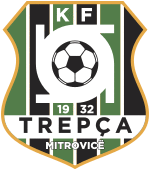 | |||
| Full name | Klubi Futbollistik Trepça | ||
|---|---|---|---|
| Nickname(s) | Xehetarët (The Miners) | ||
| Founded | 1932 | ||
| Ground | Olympic Stadium Adem Jashari | ||
| Capacity | 18,500 | ||
| Coordinates | 42°53′0″N 20°52′0″E / 42.88333°N 20.86667°E | ||
| President | Nexhmedin Haxhiu | ||
| Manager | Sheremt Isufi | ||
| League | First Football League of Kosovo | ||
| 2019–20 | First Football League of Kosovo, 11th of 16 | ||
| |||
Klubi Futbollistik Trepça, commonly known as Trepça, is a football club based in the southern part of Mitrovica, Kosovo.[a] The club was founded in 1932.[1] The club is not to be confused with FK Trepča, which plays in Serbian football league system.
History
In 1999 after the Kosovo war, many of the Kosovo Albanian players left the Serbian club FK Trepča and decided to found their own club.[1] The club colours are black and green. The Albanian club received the name KF Trepça, the Albanian name for FK Trepča, thus there were two clubs in the city with almost the same name. However, the Football Federation of Kosovo was not recognized by FIFA and UEFA until 2016.[2][3] The main supporters of KF Trepça are TORCIDA 1984 which were formed on 20 March 1984 with a lot of repressions under the Serb-Yugoslavian regime and occupation in that time until the end of the war in 1999. The history of their fans is huge that cannot be said only in words, it is also the oldest Ultras-firm in all ethnic Albania. Biggest rival is Prishtina and enemy if I can say which is included in all sports especially in basketball and football, but in basketball it's been announced many times as champion of Kosovo and the Balkan League (BIBL). As mentioned, it's the biggest and strongest rival of all Ultras-groups in Kosovo is Plisat from Prishtina, they had many fights between at any place they met each other and caused human and material damage. The city of Mitrovica is divided in two parts the north side which is lived mostly by Serbians and the south side lived by Albanians, both sides hates each other due to historical events that happened long time ago and both sides have 3 Ultras-groups Torcida in south, Delije in north and Grobari in Zvecan which is a little bit far from the north side. Many times there been between these two Utras groups from North side and Torcida. This patriotic town is known for its name Black and Green city and the Town of Miner's Trepça.
The generations from the 1970s Trepča that made Mitrovica an important point in the Yugoslav football map are part of the heritage of FK Trepča K. Mitrovica that in 1999 moved to the northern part of the town and plays nowadays in Serbian lower leagues.[4] However KF Trepca claims that heritage for themselves.[5]
Stadium
After the Kosovo war in 1999, the city was divided into a southern part with an almost exclusively Kosovo Albanian population and a northern part with a non-Albanian or predominantly Serb population.[6] During the war, many Serbs and non-Albanians fled to the northern part of the city or were expelled. The 2004 unrest in Kosovo reinforced the ethnic division of the city.
The home ground of the club is now the Trepča Stadium, the same stadium where the Serbian club FK Trepča played until 1999.[6] The stadium is located in the southern part of the city, but FK Trepča is based in North Kosovska Mitrovica, in North Kosovo; it is not currently possible for them to play their home matches in their former home stadium.[3][6] Currently, only Albanian teams play in Trepča Stadium, including the KF Trepça.[6] The Trepča Stadium is now called Olympik Stadiumi Adem Jashari by the Kosovo Albanian population, after Adem Jashari, a former leader of the Albanian paramilitary rebel organisation UÇK; the non-Albanian population still uses the name Stadion Trepča.[1] The stadium is the largest in Kosovo with a capacity of 18,200.
Honours
Kosovar Superliga
- Winners (7): 1947, 1949, 1950, 1952, 1955, 1993, 2010
Kosovar Cup
- Winners (1): 1992
Players
Note: Flags indicate national team as defined under FIFA eligibility rules. Players may hold more than one non-FIFA nationality.
Where a player has not declared an international allegiance, nation is determined by place of birth.
|
|
Youth squad
Note: Flags indicate national team as defined under FIFA eligibility rules. Players may hold more than one non-FIFA nationality.
Where a player has not declared an international allegiance, nation is determined by place of birth.
|
|
See also
- FK Trepča
Notes
| a. | ^ Kosovo is the subject of a territorial dispute between the Republic of Kosovo and the Republic of Serbia. The Republic of Kosovo unilaterally declared independence on 17 February 2008. Serbia continues to claim it as part of its own sovereign territory. The two governments began to normalise relations in 2013, as part of the 2013 Brussels Agreement. Kosovo is currently recognized as an independent state by 98 out of the 193 United Nations member states. In total, 113 UN member states recognized Kosovo at some point, of which 15 later withdrew their recognition. |
References
- ^ a b c Alo!:Pod zastavu Kosova ni za milion evra! (serbian) Archived 2015-07-05 at the Wayback Machine
- ^ Mitgliedsverbände tagen in Sydney (german)
- ^ a b B92:Srbi s Kosova razočarani u FSS (Serbian)
- ^ Trepca, une histoire du Kosovo at footballski.fr, by Pierre Vuillermot, 20-1-2015, retrieved 29-5-2015 (in French)
- ^ KF Trepca, "KF Trepca," Historiku
- ^ a b c d Radiosarajevo!:Pod zastavu Kosova ni za milion evra! (bosnian) Archived 2016-03-03 at the Wayback Machine